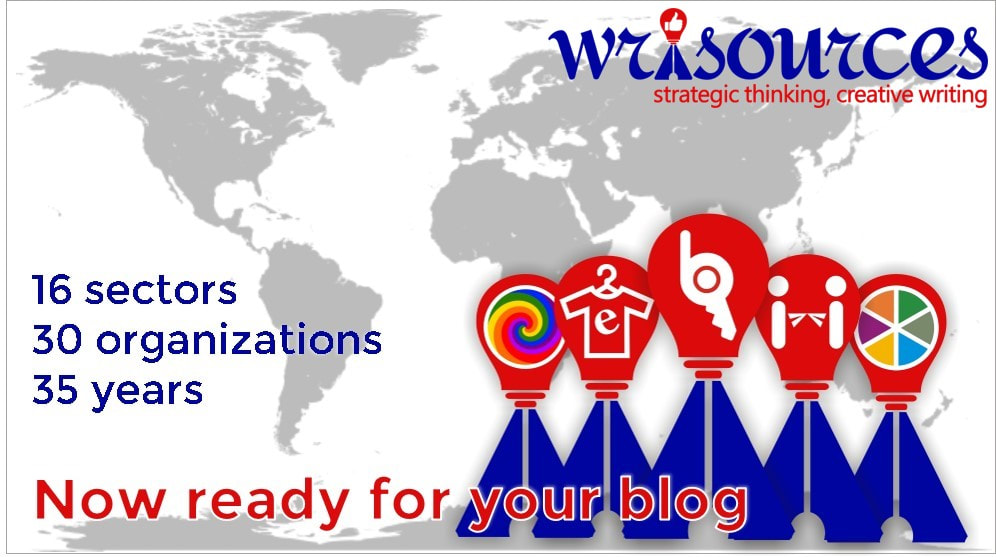|
A tall, slim Tibetan Buddhist monk in his mid-30s, Lobsang was originally from Bhutan, where he was a distant relative of the royal family. He had received a thoroughly Western education in America, graduating from Yale with a degree in Philosophy of Language and Semiotics. Lobsang was also the unofficial head of information technology at Jokhang. Whenever computers were uncooperative, printers turned surly, or satellite receiver boxes switched to passive-aggressive mode, it was Lobsang who was called upon to apply his calm, incisive logic to the problem. After the main modem went on the blink, Raj Goel, technical support services representative of Dharamsala Telecom arrived, looking extremely disgruntled. Face set to a scowl, his manner brusque, he demanded to be shown the modem and the telephone lines coming into Jokhang. Slamming his metal briefcase on a shelving unit with an angry crash, he flicked open the clasps, extracted a flashlight and a screwdriver, and was soon poking and prodding a tangle of cables, while Lobsang stood a few feet away, calmly attentive. Grunting as he got to his knees and followed a particular cable to the back of the modem, the technician muttered darkly about systems integrity, interference, and other arcane matters before seizing the modem angrily, tugging a number of cables at the back, and turning it over in his hands. “I’m going to have to open this,” the technician told Lobsang in an accusatory tone. His Holiness’s translator nodded. “Okay.” Rummaging in his briefcase for a smaller screwdriver, Raj Goel began working on the case of the offending modem. “No time for religion.” Was he speaking to himself? His voice seemed too bold for that. “Superstitious nonsense,” he complained a few moments later, even louder. Lobsang was untroubled by the remarks. If anything, a smile seemed to have appeared on his lips. But Raj was spoiling for a fight. Battling with an unyielding screw as he leaned over the modem, this time he spoke in a tone that demanded a response. “What’s the point of filling people’s heads with silly beliefs?” “I agree,” Lobsang replied. “No point at all.” After a pause, [Lobsang] continued. “One of the last things Buddha said to his followers was that anyone who believed a word he had taught them was a fool—unless they had tested it against their own experience.” Patches of sweat began appearing on the technician’s polyester shirt. Lobsang’s reaction was not the one he was after. “Sneaky words,” he groused. “I see people bowing down to Buddhas in temples. Chanting prayers. What’s that if it isn’t blind faith?” Intention matters “Before I answer that, let me ask you something.” Lobsang leaned against the door frame. “Two calls come in during the morning: one from a customer who accidently overturned a filing cabinet onto his modem, the other from a customer who got so angry with his wife for shopping online that he smashed their modem with a hammer. In both cases, the modems are broken and need to be repaired or replaced. Do you treat both customers the same?” “Of course not!” scowled Raj. “What has that got to do with bowing and scraping to Buddhas?” “Quite a lot.” Lobsang’s easy poise couldn’t have contrasted more starkly with Raj Goel's prickliness. “I’ll explain why. But those two customers—” “One was an accident,” the technician interjected, his voice rising. “The other was a deliberate act of vandalism.” “What you’re saying is that intention is more important that an action itself?” “Of course.” “So, when a person bows down to a Buddha, what really matters is the intention, not the bowing?” It was at this point that the technical support services representative began to realize he had blustered his way into a corner. Not that he was about to back out. “The intention is obvious,” he argued. Lobsang shrugged. “You tell me.” “The intention is that you are begging Buddha for forgiveness. You are hoping for salvation.” Lobsang said after a while, “Enlightened beings cannot take away your suffering or give you happiness. If they could do this, wouldn’t they have done so already?” “Then why do you bother?” The technician was shaking his head as he fiddled with the modem. “As you have already said, the intention is important. The statue of Buddha represents a state of enlightenment. Buddhas don’t need people to bow down to them. Why should they care? When we bow, we are reminding ourselves that our own natural potential is one of enlightenment.” The technician finished his work. On the way back down the corridor, as they passed Lobsang’s office, the translator said, “I have something here that may be of interest.” He ducked inside and took a book from one of the bookshelves lining the walls: The Quantum and the Lotus. Raj read the title before flicking the book open. “You can borrow it if you like.” There was an inscription on the title page from one of the book’s authors, Matthieu Ricard. “It’s signed,” noted the visitor. “Matthieu is a friend of mine.” “He has visited Jokhang?” “I first met him in America,” said Lobsang. “I lived there for ten years.” For the first time, Raj looked at Lobsang closely. That revelation was of far greater interest to him than anything else the translator had said. A week later, a more subdued Raj was back, ostensibly to return the book. It turned out that Raj was keen to go to America. He opened up to Lobsang. Parents, job or dream? Once Raj Goel started, there was no stopping him. “I have friends in New York saying, ‘Come and stay with us,’ and I am very keen to do so, because all my life I’ve wanted to visit the Big Apple and earn real dollars and maybe even meet a movie star. But my parents have chosen this girl, you see, and her parents also want us to marry, and they are saying, ‘America will always be there.’ “Also, my boss is pressuring me to go into management development training, but the loan will tie me to the company for six years and I’m feeling trapped. As it is, work pressure is already overwhelming.” He told Lobsang about the agonies of following his friends on Facebook and YouTube as they traveled around America. How his parents thought that a middle-management position with Dharamsala Telecom was the most he could ever aspire to, but he had his own, more entrepreneurial ideas. How his instincts to spread his wings were in constant tension with the loyalty he felt toward his parents, who had made great sacrifices to give him a good education. Finally, the visitor confessed the real purpose of his visit that morning: “I am hoping you can give me some advice to help me reach a decision.” “I don’t have any special wisdom,” said Lobsang, in the way that especially wise practitioners always do. “I have no qualities or realizations. I don’t know why you think I can advise.” “But you lived in America for ten years.” Raj was vehement. “And … ” Lobsang waited for him to finish. “You know about things.” Raj lowered his gaze as though embarrassed to be admitting this, especially to a man whose mental capacity he had questioned only a week earlier. Lobsang simply asked him, “Do you love the girl?” Raj seemed surprised by the question. He shrugged. “I have seen a photograph of her only once. I’m told she wants children, and my parents want us to have children.” “Your friends in America. How long will they be there?” “They have two-year visas. They plan on traveling coast to coast.” “If you want to join them, you must go—?” “Soon.” Lobsang nodded. “What is holding you back?” “My parents,” Raj retorted somewhat sharply, as though Lobsang hadn’t grasped any of what he’d been saying. “The arranged marriage. My boss who wants me to—” “Yes, yes, the management training.” Lobsang’s tone was skeptical. “Why do you say it like that?” “Like what?” “Like you don’t really believe me.” “Because I don’t really believe you.” Lobsang’s smile was so compassionate, so gentle, that it was impossible to take offense. “Oh, I believe all you say about the training and the parents and the marriage. I just don’t believe those are the real reasons you feel trapped.” Deep furrows had returned to Raj forehead. But this time they were furrows of perplexity. “I thought you would agree that these are important responsibilities.” “What—because I am a Buddhist monk?” chided Lobsang. “Because I’m a religious person who wants to uphold the status quo? Is that why you sought my advice?” Raj looked abashed. “You are an intelligent, inquisitive young fellow, Raj. You have been presented with the opportunity of a lifetime. A chance to become a man of the world and to get to understand a lot more not only about America but also about yourself. Why would you not seize this opportunity?” Lobsang posed this as a serious question, and it was some time before his visitor answered. “Because I’m scared of what may happen?” “Fear,” said Lobsang. “An instinct that prevents many people from taking actions that they know, deep down inside, would liberate them. Like a bird in a cage whose door has been opened, we are free to go out in search of fulfillment, but fear makes us look for all kinds of reasons not to.” Set to fly Raj Goel stared at the floor for a while before meeting Lobsang’s eyes. “You are right,” he admitted. “The Indian Buddhist guru Shantideva had some wise words on this very subject,” Lobsang said. He began to quote: ‘When crows encounter a dying snake, They will act as though they were eagles. Likewise, if my self-confidence is weak, I shall be injured by the slightest downfall.' “Now is not the time to be weak or to let your fears overwhelm you, Raj. You may find that if you face your fears head-on, things may not be as bad as you think. Perhaps, after your parents get used to the idea, they won’t be so disappointed. The arranged marriage can wait. Or maybe in two years’ time, there can be a different match. In the meantime, there are many, many things to look forward to. I am sure you will find America an amazing place.” “I know,” Raj Goel said, this time with conviction. Leaning forward in the chair, he picked up his briefcase and practically jumped up with newfound purpose. “You are definitely right! Thank you very much for your advice!” The two men shook hands warmly. “You may even meet a movie star,” suggested Lobsang. About two months after Raj Goel’s visits, the mail brought a glossy postcard of a glamorous female celebrity. It was for Lobsang from Raj. He was now working for one of the biggest phone companies in America. The photo was of a very famous American actress, whose phone Raj had repaired the previous week.
0 Comments
Road signs seek to remove the guesswork out of what you should be doing behind the wheel. What about people signs? What if we had to get licensed before we could start navigating relationships? People could get pulled over by relationship police for talking too fast or too long or too loud, for failure to come to a complete and thoughtful “stop” before executing a proper confrontation, or for trying to merge when all the signs said, “road closed.” It would be a great help if people had signs telling us how to respond to them as we navigate our relational lives. The truth is, they do. But we have to learn how to read them. Is it “Men At Work” or “Emotions At Work”? Is it “Road Closed” or “Heart Closed”? The most common way people send this signal is with their eyes. Eye contact produces strong emotions; in a normal conversation it rarely lasts more than three seconds before one or both people experience a powerful urge to glance away. In your interactions, look for nonverbal stop signs: People start looking away; they stop giving you little verbal cues that say they’re listening; they lean backwards; they stop interacting and asking questions. Stop talking! Give someone else a chance. When we stop talking, we also have the opportunity to engage in the most important intimacy-building skill in the world: listening. W.H.Auden wrote, “Among those whom I like or admire, I can find no common denominator, but among those whom I love, I can: all of them make me laugh.” More often than you can imagine, when people are stressed, worried, preoccupied, lonely or afraid, they carry this sign just beneath the surface: “Joy needed—please lighten up.” People who don’t take themselves too seriously give a great gift to those around them. In contrast, joy-challenged people face a serious handicap in trying to live in community. One of the hardest things in the world is to be right and not hurt anybody with it. Remember some time in school when you sat next to the smartest kid in class. Did you enjoy it? Being right (or more precisely, having the need to be right) is a terrible burden. In contrast, if you are willing to lighten up, even your mistakes can become bridges. Every single interaction we have with another person involves not simply exchanging information or performing tasks but also influencing each other’s moods and attitudes. What Daniel Goleman calls an “emotional economy” is “the sum total of exchanges of feeling among us". Emotions are more contagious than flu. Every time two people make contact, they come away feeling either better and more energized or worse and more depleted. It is as if we carry our own little emotional ATMs around with us all the time, and at each encounter we are either making deposits or withdrawals on the vitality of those around us. Some people contribute to the emotional economy; others are a drain. When some people call a meeting, you look forward to going. When someone else calls a meeting, you look for an excuse to leave early. People often use what researchers call “spatial orientation” to assess the state of a relationship. Our upper body unwittingly squares up, addresses, and “aims” at those who we like feel close to. We will tend to lean toward them. However, someone who is uncomfortable in a conversation will begin to angle their body away from the other person. The tendency to express relational dynamics by “angular distance” is so strong that it is often possible to identify the most powerful or high-status person seated at a conference table by the relative number of torsos aimed in her or his direction. Sometimes you can see a parent haranguing a child on some issue or the other. It is very clear that emotionally, for whatever reason, the child is overwhelmed or completely tuned out; he’s looking the other way, his head is hanging down, he’s responding with monosyllable or not at all. This conversation is not serving any productive purpose; it’s just an exercise in catharsis for the parent. Parents with high relational intelligence will say in these moments, “I’ve got to find another road.” Maybe that means we should have this conversation another time. Maybe that means we will have to find another way to discuss the matter. Maybe we will need to use fewer words and more questions. We may be able to push and manipulate somebody’s behavior but not their heart. Technology [has] transformed our lives. It always does and always will. The problem is that until it happens there is no way of knowing how it will change them. It often takes thirty years before the full implications of a new bit of technology reaches us. What AI will certainly do is change the way we work and live, with more and more parts of our lives organised for us by algorithms of one sort or another, from our refrigerators ordering our food on their own to our wristwatches monitoring our health and renewing our prescriptions. I worry about those algorithms. Algorithms may turn out to be the unnoticed controllers of our lives. AI will need IAs Forecasters predict that human skills will be confined to the Three Cs – the Creatives, the Carers and the Custodians. The Creatives will have the most fun and the most money, if they are successful; the Carers will be the most numerous because they include not only those who look after those in need, but also those who attend to our wants – in shops, schools, prisons, hospitals and any organisation you can think of. Then there are those who try to hold things together whom I call the Custodians. They include the executive part of the government, especially the civil service, but managers in every organisation will still be needed to plan and decide who or what does what and when. Even those driverless cars will still need to be instructed where to go. There will still be a lot of jobs, even more than before, maybe, but they will be different. My guess is that you can’t have AI without a lot of IAs (individual assistants). Short business life In my day most work was delivered by institutions, hospitals, schools, coal mines, steelworks, businesses of all sorts, small and big, the civil service, the armed services. I joined one of those businesses, an international oil company, Shell. They expected me to work with them until I was sixty-two, and on my arrival drew up a chart of the sort of career I was likely to have, with a range of increasingly senior jobs in a variety of countries. It looked exciting. Many years later I realised that not only did some of those Shell companies on the plan no longer exist, neither did the countries, at least not under the name they bore at that time. So quickly does the world change. Indeed, the average life of a business these days is only sixteen years. So how could they even think of offering you a job for life? What it means is that there is no longer such a thing as a secure job. There is no longer anyone looking after your future career as there was in Shell, planning your next move, the training you might need, even your medical requirements. You are on your own. Even if you are employed you will have to apply for any new positions that become available. Furthermore, once you are over fifty you will find those jobs increasingly hard to get. Portfolio and shamrock That is why I started to suggest that what I called a portfolio life would be the best alternative for people in that age bracket. By a portfolio life I meant a collection of small jobs, some paid, some unpaid but useful. Increasingly, however, a portfolio life began to be the life of choice for younger people, such as you. Sometimes it was because they did not fancy the controlled atmosphere of the large organisation and decided to try their luck outside. Mostly they valued the independence of the portfolio existence, risky though it was financially. Long ago, in one of my books, I suggested that organisations would increasingly resemble a shamrock with its three leaves making up the whole. One leaf would be the core employees, the second the sub-contractors and the third the individual experts or occasional workers whom it would be costly and unnecessary to employ full-time. More and more work, I suggested, would go to the second and third leaves because they would be cheaper, would not have to be on the organisation’s books or in their pension schemes. Increasingly that is what has happened. Of one thing I am certain: life for you, all being well, will be so long that one day you too will have to go solo, or portfolio, if you are going to continue to work, as I hope you will. More people than ever are working for money, as they always have, but in very different ways. No doubt those ways will change even more during your life, with automation doing a lot of the drudgery, but I feel sure that our human need to be productive will endure. Work will still be central to all our lives. A shamrock is a young sprig, used as a symbol of Ireland. The name shamrock comes from the Irish word seamair óg and means "young clover". All text in this post is from the First Letter in the book 21 Letters on Life and Its Challenges written by Charles Handy. Copyright © Charles Handy 2019. Published by Hutchinson, a part of Penguin Random House. Charles Handy has written this book for his four grandchildren. In the Introduction to the book, he writes:
"You are living in a very different world to the one I knew, but I suspect that the issues you come up against will not be that dissimilar. It is hard to learn from other people’s experiences, but my reflections may make you at least pause and think before you act, or, sometimes, think again after you have acted. These letters, you might say, contain all the stuff that I wished I had known when I was your age, before I went out into the world and had to make my own future, my own contract with life.” Charles Handy CBE (born 1932) is an independent Irish writer, broadcaster, teacher and philosopher specialising in organisational behaviour and management. He has been an oil executive, an economist, a professor at the London Business School, the Warden of St. George’s House in Windsor Castle and the chairman of the Royal Society for the Encouragement of Arts, Manufacture and Commerce. He has been rated among the Thinkers 50, a private list of the most influential living management thinkers. Instead of doing what is ethical, we figure out what we want to do and then come up with the rationalization for doing it. Getting outside help when you’re emotionally involved in an issue is a key element to living a more ethical life. By correcting even “minor” ethical lapses, we get constant practice at living more ethically. How lucky we are that life is constantly presenting us with opportunities to build up our ethical muscles. Because ethical norms evolve, becoming an ethical person is a process or practice. Being open to seeing and correcting one’s current failings is essential to that process. Technology has made it essential to accelerate the evolution of our ethical behaviour. Science and engineering have given us physical powers that traditionally were thought of as belonging only to the gods. Only God could destroy cities with thunderbolts. Today, we can do the same with nuclear weapons. Only God could cause a flood that would necessitate Noah building an ark, whereas human-induced global warming threatens similar devastation. Only God could create new life forms, whereas genetic engineering allows us to do so routinely. Nuclear weapons, environmental crises, and genetic engineering are symptoms of a deeper, underlying problem: the chasm between our technological power on the one hand and our ethical development on the other. Humanity is like a sixteen-year-old with a new driver’s license who somehow got his hands on a 500-horsepower Ferrari. We will either accelerate our ethical evolution or we will kill ourselves. While we have made significant progress in all dimensions related to the survival of civilization, we still have far to go. No one person can solve this problem. But if enough of us move things a little, together we can change the substrate of the world and create new possibilities. That’s how slavery ended, women got the vote, and more. If enough of us work at accelerating humanity's ethical evolution, together we will not only triumph over the threats we face; we will also build a more peaceful, sustainable world that we can be proud to pass on to future generations.
Credits:
https://tinyurl.com/martinlindau https://tinyurl.com/yx9goj7q https://tinyurl.com/scaredemoji |
Vijayakumar Kotteri
Abstracts from works of different authors. Archives
November 2021
Categories |

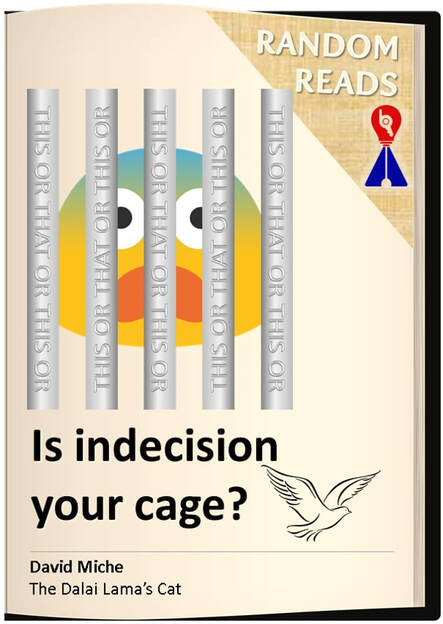







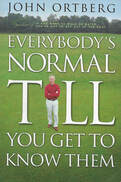
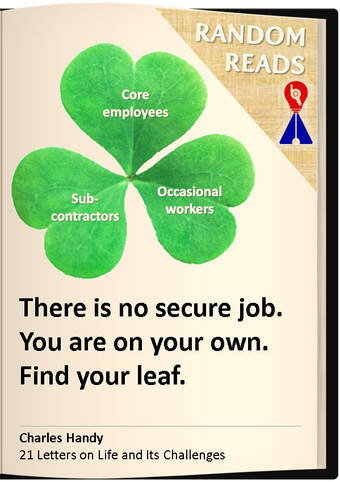
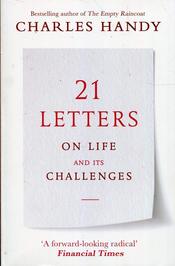
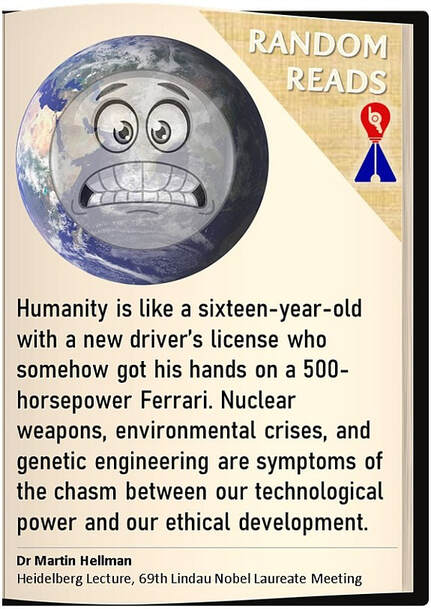
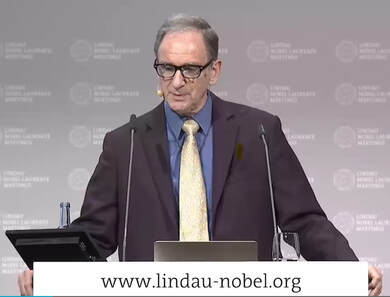
 RSS Feed
RSS Feed
